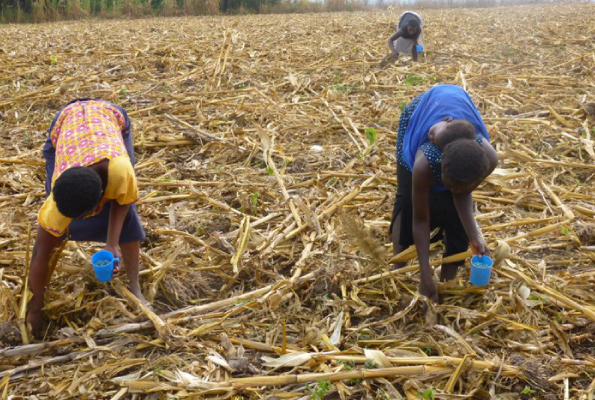What you need to know about good quality seed

Women planting maize under zero-cultivation system. With good quality seed, such smallholder farmers can increase their yields significantly. FILE PHOTO
What you need to know:
Getting good yields is the goal of many farmers. However, many may not get the expected results owing the nature of seed, seedlings and planting material. Here are tips to consider.
It is a common talk amongst the farming community that several seed dealers around the country have the tendency of supplying fake seed and seedlings to farmers involved in growing crops of different varieties.
However, there is still some hope for farmers intending to purchase quality seeds in the open market.
Dr Phinehas Tukamuhabwa, a senior lecturer at Makerere University’s Department of Food Science and Technology, identified the characteristics of quality seed.
It is one that is disease- and pest-free, pure genetically, has relatively uniform size and same colour, it is pure from physical impunities like sand, stones and any other foreign particles and it should be capable of germinating.
Obtain high yields
He was speaking at Ag Content Café, which was held last month in Kampala, as one of the special guests invited to speak on the theme, “Quality Seed for the small-holder farmer in Uganda”.
An initiative of the Usaid Feed the Future Agricultural Inputs Activity, Ag Content Café is a monthly informal meet of media practitioners and professionals in agriculture or agribusiness.
Dr Tukamuhabwa pointed out that 90 per cent of the farmers in Uganda are smallholder s who would have to purchase quality seed in order to obtain high yields.
This is possible by identifying its quality as well as from labels on the packaging. However, farmers can also reproduce the seeds as much as they want.
Address challenges
Focusing his discussion around soya bean, for which as a breeder he is involved in seed multiplication for farmers, he noted other legumes such as groundnuts and beans can also be reproduced by farmers. But it is advisable to purchase them from the appropriate seed dealers.
Also speaking the same occasion, Dr Andrew Kiggundu from National Agricultural Research Laboratories, says seeds and breeding systems were previously handled by the National Agricultural Research Organisation (Naro) to address challenges faced by smallholder farmers in terms of seeds.
But now Naro scientists are breeding seeds and seedlings to address challenges that could be faced by farmers in the future.
This arrangement is done basing on the commodities of interest like cassava, maize, rice, banana, coffee, tea, fruits, livestock as well as fisheries including cage fishing and aquaculture in general.
Commercial breeding
Naro also conserves seeds in the gene bank in Entebbe under cold conditions in refrigerators as well as the botanical garden and other gene bank sites in the different parts of the country, where varieties of crops for gene use are kept to improve on the quality of seeds.
Those crops that are vegetative propagated can be bred using cuttings of the stem like in the case of cassava, sweet potato and banana.
Some seeded crops are self-pollinated like groundnuts, beans, rice, among others, but for the case of maize and a number of vegetable crop varieties, they produce seeds through cross-pollination with another plant.
According Dr Kiggundu, seed became a commercial commodity for farmers when seed companies came to trade in the business under a regulated arrangement.
The issue of intellectual property also came in and that is how the Plant Variety Protection (PVP) law was drafted to cater for breeders rights.
This means a seed company breeding seeds will expect another seed dealer to enter into an agreement with it before he or she can proceed to commercialise these seeds.
Discussing the issue of improved seed breeding using biotechnology, Dr Kiggundu explained that this was a result of crops that are sterile like banana, cassava, sweet potato that do not have the biological capacity to produce seeds for planting.
Dealing with fakes
This issue was also coupled with issues of rampant pest and disease infestation
“Due to the sterility and disease burden on these crops, breeding using traditional methods became a problem and that when we started understanding the inheritance of these crops using controlled genes,” he said
On his part, Richard Masagazi, chairperson of Uganda Seed Traders Association, explained the scenario of farmers faced with the challenge of purchasing fake seed in the market as real
To him, fake seed may arose from issues of copied or forged labels, wrong packaging and other factors.
One of the way to address this is through the seed companies developing tamper-proof labels that may require particular packaging materials thus making it difficult to duplicate.
Other measures could be involvement of inspection service by the required seed regulatory body as well as implementation of the national seed certification process.




